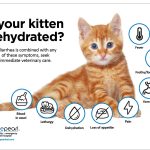As a new kitten parent, there’s nothing more worrying than seeing your four-month-old ball of fluff suddenly go from playful to miserable. You may have noticed that their usually bright eyes are now dull and glassy, and their once-lively pounces have turned into sluggish crawls.
Diarrhea in 4-Month-Old Kittens: A Concern for Newborn Feline Health
When your kitten’s digestive system starts to go awry, it can be a sign of an underlying issue that requires prompt attention. In this blog post, we’ll delve into the world of feline health and explore the reasons behind diarrhea in 4-month-old kittens. From identifying the warning signs to understanding the potential causes, we’ll cover everything you need to know to keep your kitten happy and healthy.
Why Diarrhea Matters: A Kitten’s Life Depends on It
A kitten’s digestive system is still developing in those early months, making it even more crucial to monitor their health closely. Prolonged diarrhea can lead to dehydration, electrolyte imbalances, and even life-threatening complications if left untreated. As a responsible pet owner, it’s essential to stay vigilant and take prompt action if you notice any unusual changes in your kitten’s stool quality or frequency.
As we’ve established, diarrhea in 4-month-old kittens is a serious concern that requires immediate attention. But what are the warning signs you should look out for? And what causes this sudden change in your kitten’s digestive system?
Common Warning Signs of Diarrhea in Kittens
Apart from the obvious changes we mentioned earlier, there are some other subtle clues that might indicate your kitten is experiencing diarrhea. Keep an eye out for:
- Changes in stool quality: If you notice your kitten’s stool has become loose, watery, or bloody, it could be a sign of digestive distress.
- Increased frequency: A sudden increase in the number of bowel movements is another red flag to watch out for.
- Whining or acting lethargic: If your kitten becomes whiny, lethargic, or shows less interest in their surroundings, it could be a sign that they’re uncomfortable and in need of attention.
The Potential Causes of Diarrhea in Kittens
Now that we’ve identified the warning signs, let’s dive into some of the possible causes behind your kitten’s diarrhea:
- Infection: Bacterial or viral infections can cause digestive issues in kittens. Consult with your vet if you suspect an infection.
- Dietary changes: Sudden changes to your kitten’s diet, such as switching from mother’s milk to commercial food, can cause digestive upset.
- Parasites: Intestinal parasites like worms or giardia can contribute to diarrhea in kittens. A fecal exam by your vet can help identify these pesky critters.
- Feline hyperesthesia syndrome (FHS): This condition causes sensitivity to touch, which can lead to stress and digestive issues.
As you can see, there are many potential reasons behind a kitten’s diarrhea. The key is to stay vigilant and consult with your vet if you notice any unusual changes in your kitten’s behavior or stool quality.
For more information on kitten health and nutrition, check out the Merck Veterinary Manual or the American College of Veterinary Physicians.
Expert Consultation for Diarrhea in Kittens
Get personalized guidance from medical professionals on how to care for your kitten’s diarrhea.
Consult with an expertIn our previous sections, we’ve explored the importance of monitoring your 4-month-old kitten’s health, particularly when it comes to diarrhea. We’ve discussed the warning signs and potential causes behind this common feline issue.
Summarizing the Key Points
To recap, here are the key takeaways:
- Diarrhea in 4-month-old kittens can be a sign of an underlying issue that requires prompt attention.
- A kitten’s digestive system is still developing during those early months, making it crucial to monitor their health closely.
- Prolonged diarrhea can lead to dehydration, electrolyte imbalances, and even life-threatening complications if left untreated.
- The causes of diarrhea in kittens can range from dietary issues to infections and parasites.
Final Insights
If you suspect that your kitten is experiencing diarrhea, it’s essential to take immediate action. Consult with a veterinarian as soon as possible to rule out any underlying conditions that may require treatment. With proper care and attention, most kittens can recover quickly from an episode of diarrhea.
Conclusion
As a new kitten parent, it’s natural to feel concerned when you notice unusual changes in your pet’s behavior or health. By staying informed about common issues like diarrhea and knowing what signs to look out for, you can take proactive steps to ensure your kitten stays happy and healthy. Remember, prompt attention and proper care are crucial in these early months. With the right guidance and support, you’ll be well on your way to raising a strong and resilient feline companion.
Red bumps on head of penis: Are you concerned about those pesky red bumps on your manhood? This article reveals the shocking causes and solutions to this common issue. Don’t let embarrassment hold you back – get informed and take control!
Allergy eye drops at CVS: where to buy and more: Got itchy eyes? This article is your one-stop-shop for all things allergy eye drops! From CVS locations to alternative remedies, get the inside scoop on what you need to know.



